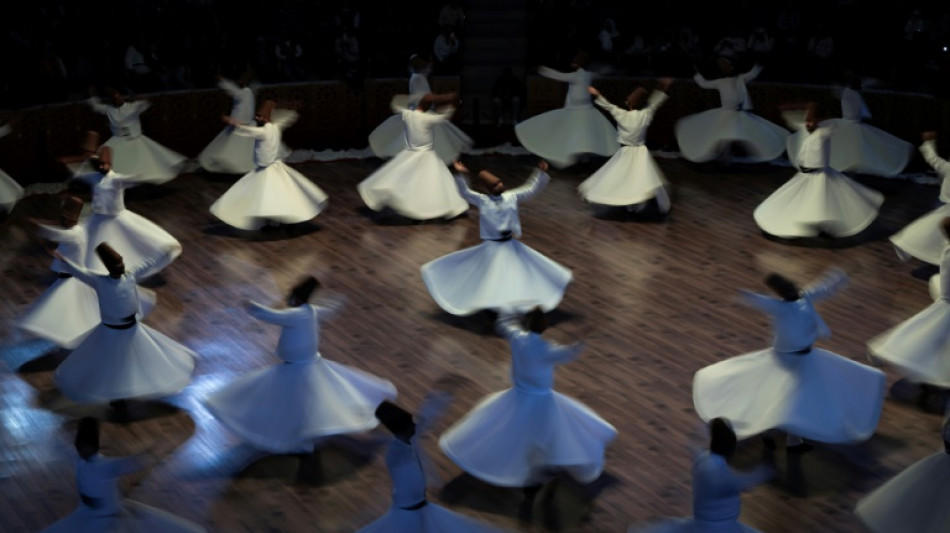
-
 Ukraine's Heraskevych appeals to CAS over Olympic ban as Malinin eyes second gold
Ukraine's Heraskevych appeals to CAS over Olympic ban as Malinin eyes second gold
-
Stocks mostly drop after Wall Street slide

-
 Sophie Adenot, the second French woman to fly to space
Sophie Adenot, the second French woman to fly to space
-
Alleged rape victim of Norway princess's son says she took sleeping pills

-
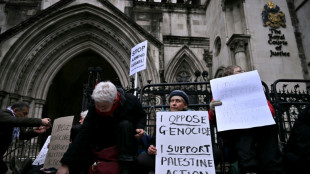 Activist group Palestine Action wins legal challenge against UK ban
Activist group Palestine Action wins legal challenge against UK ban
-
Driven by Dhoni, Pakistan's X-factor tweaker Tariq targets India

-
 Davidson set to make history as Ireland seek to rebound against Italy
Davidson set to make history as Ireland seek to rebound against Italy
-
Europe defends NATO, US ties at security gathering

-
 China's fireworks heartland faces fizzling Lunar New Year sales
China's fireworks heartland faces fizzling Lunar New Year sales
-
Bangladesh's Yunus 'banker to the poor', pushing democratic reform
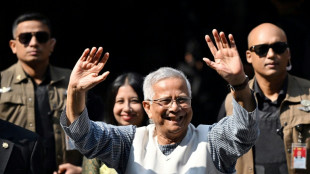
-
 Cracknell given Six Nations debut as Wales make changes for France
Cracknell given Six Nations debut as Wales make changes for France
-
L'Oreal shares sink as sales miss forecasts

-
 Bangladesh nationalists celebrate landslide win, Islamists cry foul
Bangladesh nationalists celebrate landslide win, Islamists cry foul
-
Thai PM agrees coalition with Thaksin-backed party

-
 Zimbabwe pull off shock win over Australia at T20 World Cup
Zimbabwe pull off shock win over Australia at T20 World Cup
-
Merz, Macron to address first day of Munich security meet

-
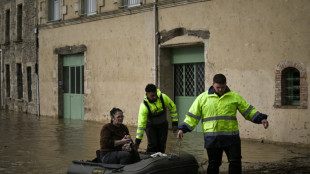 Three dead, many without power after storm lashes France and Spain
Three dead, many without power after storm lashes France and Spain
-
Bennett half-century as Zimbabwe make 169-2 against Australia

-
 Asian stocks track Wall St down as traders rethink tech bets
Asian stocks track Wall St down as traders rethink tech bets
-
'Weak by design' African Union gathers for summit

-
 Nigerian conservative city turns to online matchmaking for love
Nigerian conservative city turns to online matchmaking for love
-
Serb-zero: the 'iceman' seeking solace in extreme cold

-
 LeBron James nabs another NBA milestone with triple-double in Lakers win
LeBron James nabs another NBA milestone with triple-double in Lakers win
-
Hundreds of thousands without power after storm lashes France
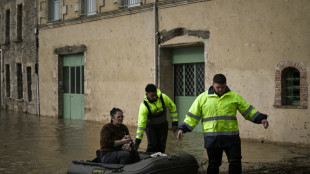
-
 US Congress impasse over migrant crackdown set to trigger partial shutdown
US Congress impasse over migrant crackdown set to trigger partial shutdown
-
AI's bitter rivalry heads to Washington

-
 South Korea hails 'miracle' Choi after teen's landmark Olympic gold
South Korea hails 'miracle' Choi after teen's landmark Olympic gold
-
England seek statement Six Nations win away to Scotland

-
 Trent return can help Arbeloa's Real Madrid move forward
Trent return can help Arbeloa's Real Madrid move forward
-
Battling Bremen braced for Bayern onslaught

-
 Bangladesh nationalists claim big election win, Islamists cry foul
Bangladesh nationalists claim big election win, Islamists cry foul
-
Tourists empty out of Cuba as US fuel blockade bites

-
 Tearful Canadian mother mourns daughter before Carney visits town shaken by killings
Tearful Canadian mother mourns daughter before Carney visits town shaken by killings
-
Italy dream of cricket 'in Rome, Milan and Bologna' after historic win

-
 Oscars museum dives into world of Miyazaki's 'Ponyo'
Oscars museum dives into world of Miyazaki's 'Ponyo'
-
Dieng powers Bucks over NBA champion Thunder

-
 Japan seizes Chinese fishing vessel, arrests captain
Japan seizes Chinese fishing vessel, arrests captain
-
Bangladesh political heir Tarique Rahman poised for PM

-
 Asian stocks track Wall St down but AI shift tempers losses
Asian stocks track Wall St down but AI shift tempers losses
-
Bangladesh's BNP claim 'sweeping' election win

-
 Drones, sirens, army posters: How four years of war changed a Russian city
Drones, sirens, army posters: How four years of war changed a Russian city
-
Crowds flock to Istanbul's Museum of Innocence before TV adaptation

-
 North Korea warns of 'terrible response' if South sends more drones
North Korea warns of 'terrible response' if South sends more drones
-
NASA crew set for flight to ISS

-
 'Punk wellness': China's stressed youth mix traditional medicine and cocktails
'Punk wellness': China's stressed youth mix traditional medicine and cocktails
-
Diplomacy, nukes and parades: what to watch at North Korea's next party congress

-
 Arsenal, Man City eye trophy haul, Macclesfield more FA Cup 'miracles'
Arsenal, Man City eye trophy haul, Macclesfield more FA Cup 'miracles'
-
Dreaming of glory at Rio's carnival, far from elite parades

-
 Bangladesh's BNP heading for 'sweeping' election win
Bangladesh's BNP heading for 'sweeping' election win
-
Hisatsune grabs Pebble Beach lead with sparkling 62


'Third way': Turkey's whirling dancers celebrate mystic Rumi's tolerance
The skirts of whirling dervishes twirl in a symphony of disco colours celebrating mystic Sufi poet Rumi at a cultural centre in central Turkey's Konya.
Every year, the "Seb-i Arus" ("Wedding Night") festival honouring Rumi's death on December 17, 1273, draws so many people that traditional venues are not large enough to contain the crowds.
Pilgrims, tourists, meditation enthusiasts and the curious flock to this vast Anatolian city, where Rumi -- or Mevlana as he is known in Turkey -- spent most of his life after being driven out of modern-day Afghanistan in the 12th century by Mongol invaders.
His writings have gradually spread well beyond central Asia and won acclaim in the West. Pop legend Madonna adapted one of Rumi's poems and Beyonce named her daughter after him.
"Rumi's works have been translated into almost every language, and in the United States alone more than 250 books are dedicated to him," said Nuri Simsekler, a specialist in Persian literature at Konya's Selcuk University.
"Rumi speaks to all humans, telling us about ourselves," Simsekler said of Rumi's enduring popularity seven centuries after his death.
- Dance ritual -
The "sema" rituals -- which honour Rumi's legacy -- are performed by whirling dervishes who don a tall light brown hat, with their arms elegantly spread.
The order was established after Rumi's death by his son and descendants.
To the sounds of reed flutes and tambourines, the dervish takes off his long black cloak to dance, but keeps his cylindrical felt hat on. The "sikke" represents the tombstone which will one day stand at the head of his grave.
Then the dance begins. Extending his right hand toward the sky and his left towards the ground, the whirling dervish forms a link between the two.
"Rumi is the first person on Earth whose death is not mourned but celebrated," Simsekler said.
From her office window, Esin Celebi Bayru has a clear view of the turquoise dome that tops the mausoleum of her illustrious ancestor.
Large crowds from Turkey and Iran -- where the poet is also a national icon -- but also Britain and Singapore are expected to celebrate Rumi's 750th "Wedding Night" with God at his tomb.
Such a major anniversary of his death was "an opportunity to make him even better known," said Celebi Bayru, a 22nd generation descendant of the Sufi poet.
She and her brother co-chair the Mevlana International Foundation, created in 1996 in Konya to perpetuate Rumi's legacy.
"In these times of war, Mevlana's word is like a light for us," she said of his many appeals for tolerance and peace. "People come here from all over the world."
- Prayer or meditation-
Celebi Bayru said she has recently been invited to lecture in places as distant as Hawaii, Australia, India and Pakistan.
Every year, she also receives film scripts, and hopes one day to see a biopic of Rumi brought to the screen.
Everywhere in Konya, souvenirs bearing the image of Rumi and dervishes fill stalls.
Ironically, the most famous master of Sufism -- who taught tolerance with the words "come, come, whoever you are, wanderer, worshipper, lover of leaving" -- is honoured in a city with one of Turkey's most staunchly conservative Sunni traditions.
In front of his immense green and gold tomb, a grumpy Sunni pilgrim curses as Rumi's followers sit on the ground, eyes closed, fingers pointing to the sky.
"This is not a place for meditation, it's for prayer," the Sunni pilgrim complained.
The incident only makes sheikh Mehmet Fatih Citlak smile.
Under a headdress lined with 20 metres of braided green ribbons, he presides over more spiritual "semas" at the Irfan Study and Research Centre in Konya, where prayers are interspersed with music and songs.
"We don't just twirl around all day," laughed the sheikh, who was recently invited to perform at Oxford University by its art history department.
"But as long as we stick to our discipline, we don't mind the public," he added, saying that "between art and love, Mevlana offered us a third way.
"Everyone interprets him in their own way," he said.
"But if he were better understood, would the world be in the state it is in today?"
L.Davis--AMWN